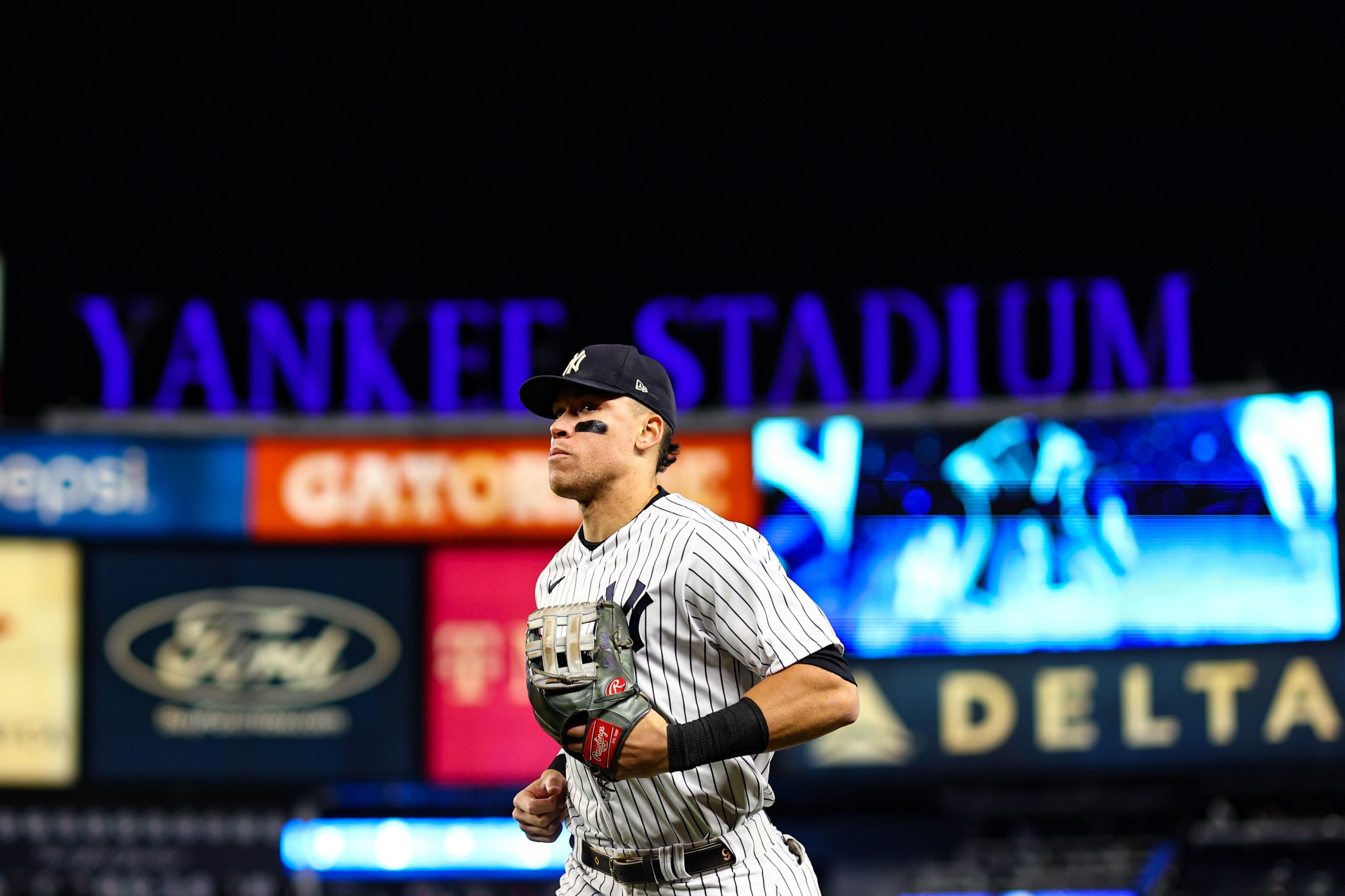There are three types of Major League Baseball teams where free agency is concerned. There are the ones that try to sign players, and ones that do not try to sign players, and then there are the teams that sort of try to sign players but mostly want it to be known that they were also in on a player that some other team signed. The membrane between these types is thin and highly permeable. Teams that signed players will reassess and decide to become the type of team that doesn't, generally for reasons having to do with a plan that an executive the owner hired away from the Astros will hint at without ever really quite laying out in a legible way.
Even accounting for the teams that opt out of paying market rate for baseball players because their owners are either content with straightfaced not-trying or the deluxe version of not-trying that wears a quarter-zip fleece and periodically burps out things like "machine learning" and "flexibility on the go-forward," there are teams that do and there are teams that do not. A team that has decided to do-not will seldom make a point of mentioning what they almost but ultimately did not do, if only because they have signaled that they are not really trying to do anything. Of all the insults these teams reliably deliver to their fans, the A's at least have the grace not to claim that they were in on Aaron Judge until the very end, as opposed to their more ostentatious but equally emptyhanded neighbors to the west.
But the teams that are trying and the teams that are not are easy enough to identify, and understand. It is that last and most poignantly thwarted group that will tell you the most about the state of baseball's semi-free market. These teams are all subject to the same pressures—ownership's will to win or determination to project that impression in a convincing fashion; the tiered luxury tax structure that owners have decided, in a universal but plausibly non-collusive way, to treat as a salary cap—and the decisions they make reflect that. The market moves, as markets do, and it's through the response to that movement that we can tell the teams that are trying from the ones merely signifying, more in sorrow than in anger, that they had also intended to try, before things got like this.
"It's insanity," said an executive for what The Athletic's Jayson Stark identified as an "analytically inclined" organization. "It’s irrational people operating in an illogical market." The executive's main objection was to the spate of extremely long contracts that have been handed out in free agency during the early stretch of baseball's offseason, which will pay youngish stars like Trea Turner and Xander Bogaerts and Aaron Judge (and not-quite-stars like Brandon Nimmo) nearly or all the way through their 30's.
Until very recently, teams explicitly avoided this kind of commitment, for reasons that were both easy to understand—baseball players, like just about everyone else, tend to decline as they approach 40, and get kind of weird and sad afterwards—and easy to sell as a justification for why a team decided not to act. It's not that the team didn't think [Expensive Free Agent] would help, of course, but they just couldn't justify sacrificing future payroll flexibility for the extra year or two years that [Team That Actually Signed Expensive Free Agent] was willing to offer. This is loser talk, mostly, but familiar enough and mainstream enough both in its mewling form and cynical content that it barely even registers anymore.
And even as the rest of the sport, or at least the handful of baseball teams that are actively trying to win the World Series, have learned how to stop worrying and love comparatively low average annual salaries spread across a decade-or-so, there are teams that are still talking like this. The Cubs have taken a different approach to free agency thus far, for instance, steering clear of bigger and more expensive names in favor of the sort of two- and three-year free agent commitments that might buoy a team towards respectability without, say, adding significant costs to a team whose owners might be interested in putting it up for sale at some point. Bringing in free agents like Carlos Correa or Dansby Swanson to plug the team's hole at shortstop would make the team a lot better, but would also require the sort of commitment that the team, for reasons of principle or best practices or just the cheesy chiseling of their anhedonic ownership, seems unwilling to make. If you'd prefer a more evocative expression of this, the last week also gave us Red Sox GM Chaim Bloom stammering to himself at an airport gate like a damn Noah Baumbach character upon realizing that his best offer to Bogaerts was half-a-decade and more than $100 million short. This is all sort of the same thing, and anyway all ends up in the same place.
In his Athletic story, Stark examines some of the reasons why the market might have moved in this particular way. Notable among these is that teams believe that there is no reason players necessarily have to age as they used to; an aging ace like Justin Verlander, who benefits from state-of-the-art training methods, should not and indeed has not aged like his counterparts from the 1980's and '90s, most of whom were still living what might be described as The Lyndon Johnson Lifestyle. "Look at the top tennis players," Phillies GM Dave Dombrowski told Stark. "Those players never used to last until they were 40 years old. But they’re finely tuned athletes that train well, that commit to doing it. And again, I’m not saying that it happens with everybody. But when you have elite athletes, they’re a little bit different than the average athlete." Dombrowski recently bet a lot of John Middleton's money on the likelihood that Trea Turner will age more like Roger Federer than Roger Cedeño, but there are some convincing reasons to believe that he might.
There is also a non-baseball justification for these strangely shaped deals, which is that a lot of money spread over a long time will produce a lower average annual salary, which happens to be the method that the league uses to calculate the luxury tax. It's for that reason, the New York Post's Jon Heyman reported, that MLB was prepared to block a rumored 14-year, $400 million contract offer to Aaron Judge from the San Diego Padres. The league was willing to take this step not because of the self-evident fact that A.J. Preller has a problem and needs help, but because such a deal would have been too plain an attempt to evade the luxury tax. "Offering something like the nine-year, $360 million deal to which Judge actually agreed with the Yankees would’ve come with a $40 million AAV that stuck the Friars with approximately $22.4 million in taxes," Anthony Franco explains at MLB Trade Rumors. "Conversely, a 14-year, $400 million offer would’ve come with an additional tax bill around $15.3 million."
A person could quibble with paying Aaron Judge $28 million for his age-43 season in order to save $9 million in taxes next year, I guess, although I think the arguments against quibbling far outweigh those pointing quibbleward. This is true even considering that these players will get worse over the course of their contracts. "38 is still 38,” a small-market exec told Stark. “And 40 is still 40. And I don’t think we’ve found a way for skills not to decline. We can slow the decline, but I don’t think we’ve found a way to stop the decline." This can be true, and still be insufficient as an executive justification for inaction.
Fans, on the other hand, have no need to be that circumspect. For one thing, it is not your money; for another, no one knows where or indeed if any of us will be in 14 years. More than that, though, the best arguments for baseball's decade-long free agent deals are the nature of how baseball works, and how time moves. It may be that baseball teams have learned enough to make the future unfold quite differently than the past, and that Trea Turner will, if not doing CGI-looking slides at age 39, at least be a moderately healthy and productive 39-year-old left fielder, or designated hitter at the very least. But also that reckoning isn't here yet. It's tough to imagine a worse place to be, as a team but especially as a fan, than watching some other team raise a championship flag and muttering, "They're going to regret that." Even if you're correct, you're not correct yet. And until then, you're stuck there with everyone else trying to explain why it was so obviously the right move not to try.






